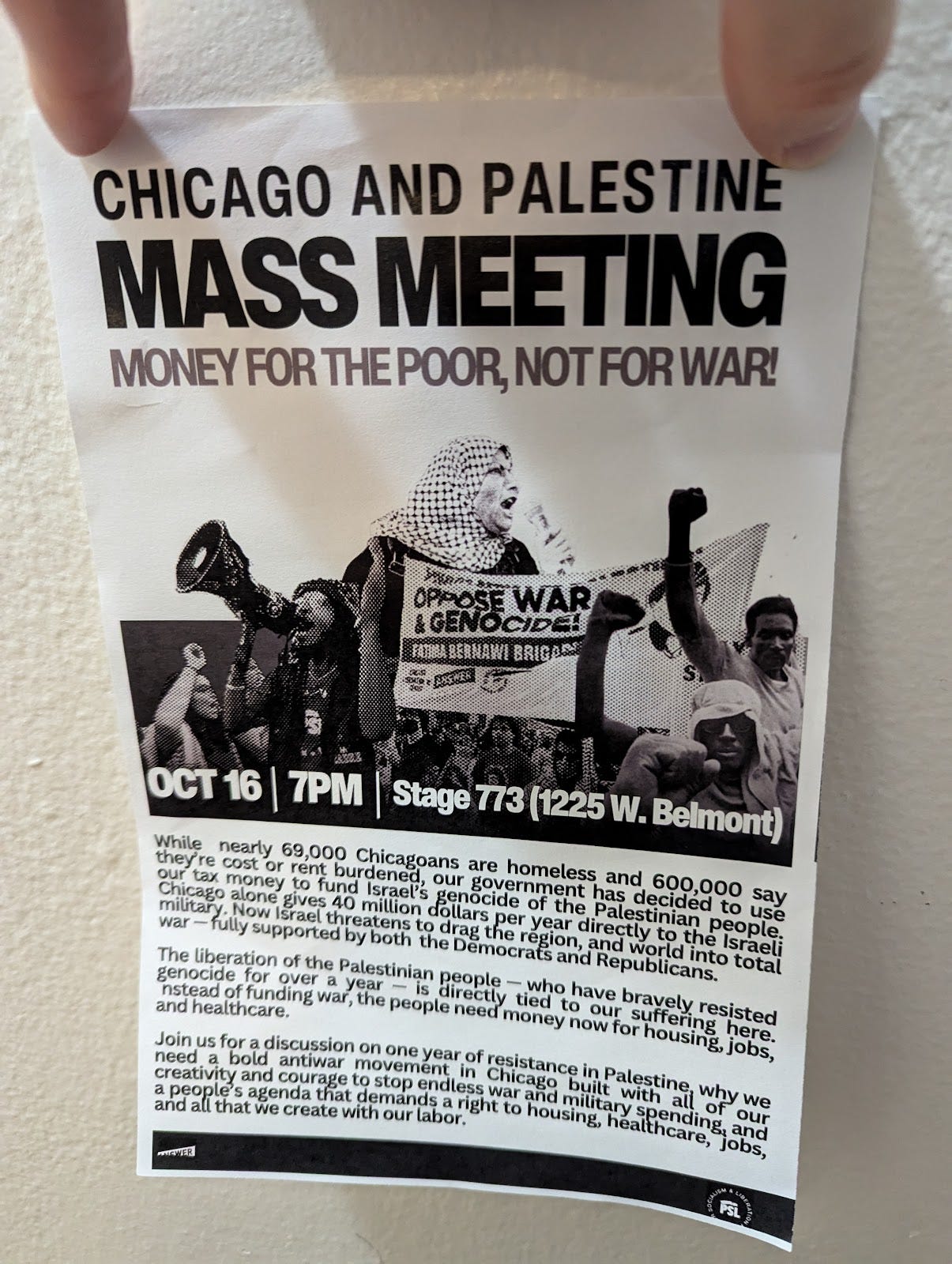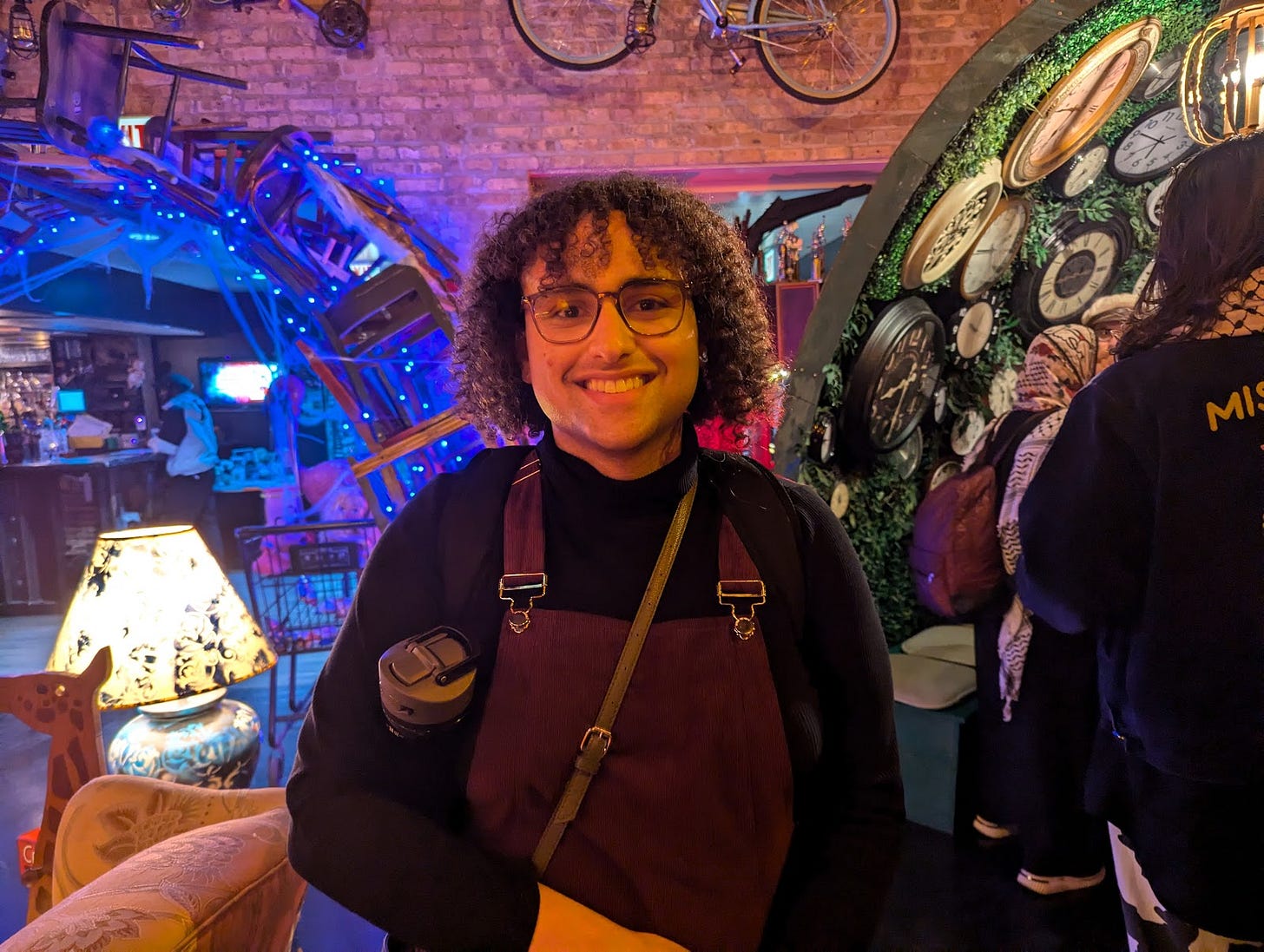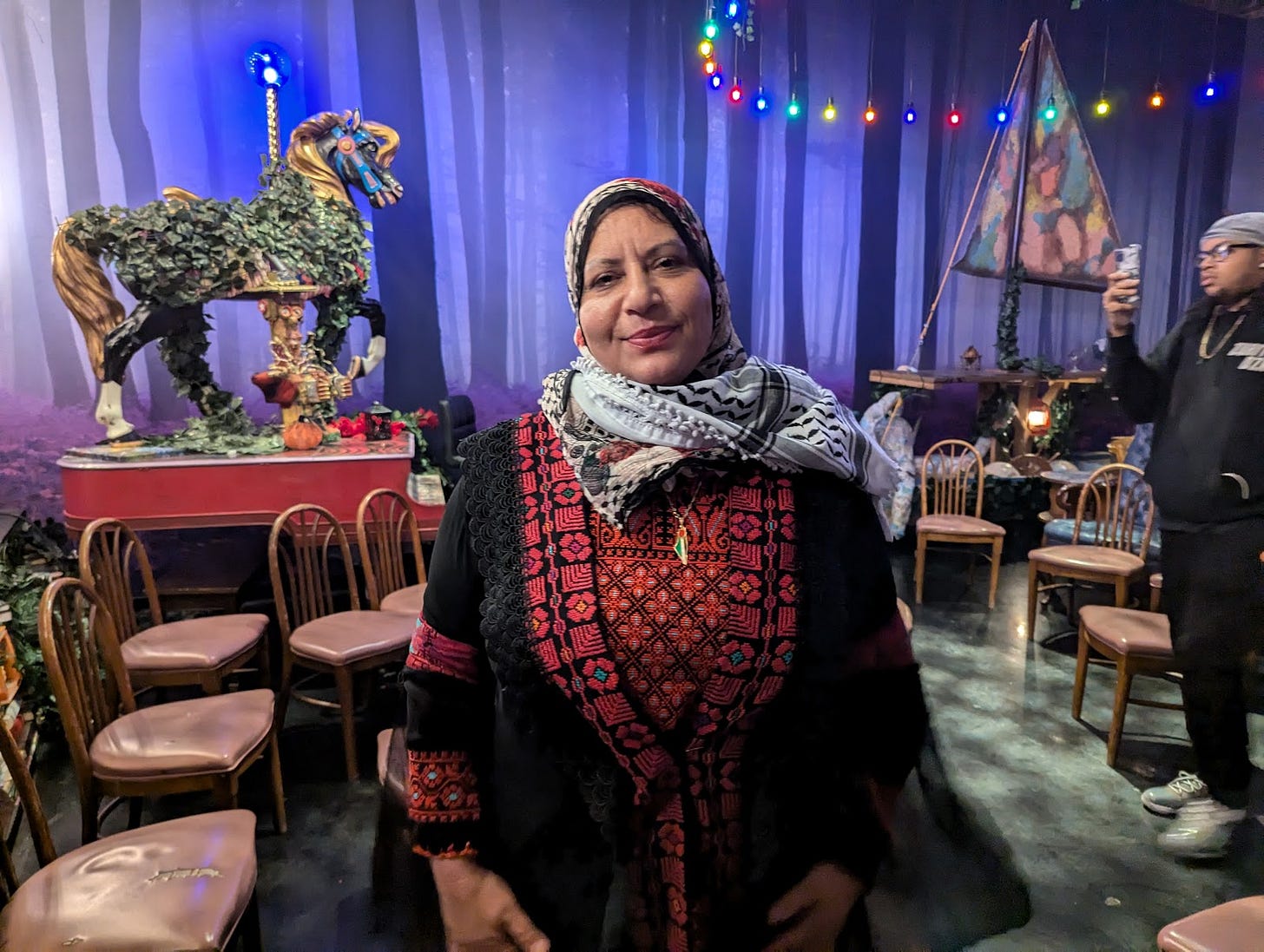Inside the Party for Socialism and Liberation’s Chicago and Palestine meeting
The leftist Party gathering took aim at American (and Chicagoan) support for Israel
Like most Americans, I had never heard of the Party for Socialism and Liberation. That was until their announcement on the Chicago Red Line roused me from a fast food-induced slumber.
“Chicago gives millions in taxes to Israel to fund their genocide of Palestinians! We need to come together to stop it. The Party for Socialism and Liberation is hosting a meeting on Wednesday, October 16, to do something about it,” one of the Party members said sternly (or something like that, I was pretty groggy).
They and their comrade sheepishly walked up and down the train car, half-heartedly holding up fliers for passengers to take. I don’t blame the Party foot soldiers for looking discouraged — most commuters seemed too tired, high, or bewildered to hear out these subway-sojourning radicals.
But I thought the event might make for a good story, and I didn’t have anything planned for Wednesday night other than a rendezvous with a half-empty bottle of bourbon. I took a flier.
Huh. What was the Party for Socialism and Liberation anyway, I wondered? Well, as the name would suggest, it advocates for socialism and against capitalism in America. Also, per its website, it advocates against U.S. imperialism and for equality across the axes of race, gender and sexuality. As outlined on its Wikipedia page, the Party has written sympathetically about actions taken by North Korea and Russia’s annexation of Crimea — pretty spicy for American normies, but not all that unusual for leftists.
Whatever your thoughts on all that, there’s no doubting it sticks with you a bit more than Trump or Harris’s platforms. This would be fun.
Come Wednesday night, I stepped into Stage 773, the venue at which the meeting was held. I came to learn the space was put together by a nonprofit to support Chicago’s starving artists, and my goodness, were I an artist, I’d have felt supported. There was a little bar where the crystalized light reflecting off ornate glasses reminded you drinking was more than an exercise in slow suicide. To the left of the bar was a lounge filled with tastefully curated chairs and booths arranged for artists to give each other much-needed encouragement. Beyond this was another room where I could see members of the Party for Socialism and Liberation ushering potential recruits through the door.
Not wanting to intrude on the event without fair warning, I let a bespectacled Party veteran know that I wrote for Noir News, and that they and other party membership might know Noir from our reporting on Stanford’s Mapping Militants Project removing the Azov Battalion from its list of extremist militant groups, which was republished by The Grayzone and other outlets. There wasn’t much trepidation to begin with, but what little there was melted away by mention of the article. They ushered me in.
The room had chairs arranged in a giant circle in front of a stage. The Party members and the potential recruits trickling in looked like what you might expect: lots of tattoos and piercings, heterodox but coordinated dress, keffiyehs, cropped or swooping hair, some of which was dyed. Given Chicago’s segregation and Stage 773’s location in the affluent Lakeview neighborhood, I expected most everyone to be white. But it was a diverse crowd — it looked like what a midwestern liberal arts college wants to look like.
Leftists, especially those sporting hair dye, are often stereotyped as emotionally unstable and juvenile. But the crowd assembled by the Party for Socialism and Liberation seemed very polite, calm, and focused on their aim for the night: combatting the city of Chicago’s aid to the state of Israel.
After most of the chairs were filled, I noticed a party veteran strap on a striking red semi-hollow body electric guitar. He introduced himself, and quickly taught the room how to sing “Which Side Are You On?”, the famous union song written in 1931 by Florence Reece about the Harlan County War: a bloody struggle between a miners’ union and mine owners.
He taught one side of the room the melody and the other the harmony — a bold move when you don’t know the musical aptitude of a crowd. But either the Party lucked out and recruited people who’d spent an inordinate amount of time in church choir, or the weight of the American politique in 2024 was too great to let us slip out of tune. The room sounded like angels tired from a long day toiling in the mines.
“Come all of you good workers, good news to you I’ll tell, of how the good ol’ union has come in here to dwell,” they sang. “Which side are you on? Which side are you on?”
The song ended and was replaced by something sharper and more topical.
“From the River to the Sea, Palestine will be free! From the Sea to the River, Palestine will live forever,” the Party veterans and recruits chanted.
This is where I’m supposed to explain the phrase “From the River to the Sea.” To oversimplify, some Zionists and Jewish people at large consider the phrase to be antisemitic, either because they think calling for an end to the state of Israel in and of itself is antisemitic, or because they think the phrase calls for the killing or expulsion of some or all Jews in Israel/Palestine. The slogan does arguably call for creation of a single state in the land of Israel/Palestine, and by extension, an end to Israel as a Jewish state.
Now, I’m a Jew, and I’d try to give you a definitive answer on the implications of the phrase, but I can’t even figure out whether my circumcision was a good idea. You don’t want my consultation.
With regard to how the room was using the phrase though, while they were definitely calling for an end to the state of Israel, I doubt most were advocating for the killing or expulsion of Jews in Israel/Palestine. Half the people there would probably balk at eating unethically-sourced chocolate, let alone slaughtering Yitzhak the IT professional in Tel Aviv.
Party veterans spoke one by one on stage, each advocating for an end to American, and thus Chicagoan, aid to Israel. They linked America’s spending on wars abroad to a lack of resources for Chicago’s schools and homeless population. It was variations on this theme for most of the night, but right when things were getting a little repetitive, one Jawahir Sharwany, the special guest of the evening, took the stage.
Sharwany, who later told me she was an Arab Israeli born in Jerusalem who relocated to the States in the mid 90s, bounced around with a half-happy, half-angry jig as she pleaded with the crowd to free Palestine. She loved the Party for Socialism and Liberation, she said, because it understood that the issues of homelessness, racism, imperialism, and genocide of the Palestinians were all connected. Her speech was a bit disjointed, but that only made it more charming.
After Sharwany finished, the Party veterans hurriedly explained a fact I’d have thought would be a bit more front and center: the Party for Socialism and Liberation is running a presidential ticket of Claudia de la Cruz and Karina Garcia, both long-time leftist activists from New York City.
The candidates are great, and it’d be great if they won — but they won’t, the Party veterans explained. The point of their running isn’t to win, but to build a long-lasting political movement that could create real change and actually represent “The People.”
I took a look around the room and the potential recruits were nodding their heads and snapping their fingers. I thought again about the way the recruits were dressed and their general demeanor. Yes, they sort of looked like socialists. But they also just looked like… Gen Z kids or millennials working a shift at a coffee shop. Whatever this was, it looked a lot more representative of “The People” than did the cerebral cats at the Republican or Democratic National Conventions.
And here The People, or some of the people, were ready to toss their votes like coins into a hopeless well rather than succumb to America’s sad political duopoly.
You can only break so many promises.
I asked a Party veteran, Yasmine Dukan, about whether they thought their strategy of building a long-term movement was effective.
“I think that being in [the Party for Socialism and Liberation], we’re definitely making a difference in both raising consciousness among working class people and we’re making that effect across the city,” Dukan said.
“We need to organize among neighbors, coworkers too and build socialism and a better world for the masses, the working class,” Dukan added.
Anyway, the speeches were over and like any smart political organization, the Party for Socialism and Liberation had gotten the recruits pizza. I was tempted to stuff my face, but instead I took the time to interview Sharwany.
I asked Sharwany what got her involved with the Party for Socialism and Liberation and what brought her there that night.
“As a Palestinian, as a human being, I love when I come in to a protest or to a meeting or to volunteer and see everybody together to see everybody with different identities with different agendas, with different religions, with different backgrounds and we’re all in the same thing,” she said. “We’re all agreeing in one thing, we want, the freedom of the Palestinians, we want the freedom of human beings.
“That’s how I cope. I can’t cope all by myself in the house. I only cope when I go to an event or to protest or volunteer or talk to people in the street — regular people.”
She added that it was wrong the United States was giving large amounts of aid to Israel while offering insufficient assistance to those affected by the recent hurricanes in Florida.
Sharwany told me that, even as an Arab Israeli citizen, she didn’t feel like she had any meaningful political representation when she lived back home, and that the separation of Arab Israelis, and Palestinians in the West Bank and Gaza, was oppressive and disenfranchising.
“I’m a Palestinian. Everybody that’s there [in the West Bank and Gaza] are my family. I have people in the West Bank. A lot of them have been martyred.”
The situation of Israel/Palestine should go back to the way it was before 1948, she said.
People mean a lot of different things when they say this, so I asked her what exactly she wanted. Two states without the Nakba? A binational state in which Jews and descendents of Jews who’ve arrived in the late 19th century onwards get to stay? A binational state in which most of the Jews are made to leave?
She clarified that she wanted a binational state in which Jewish people are not forced to leave.
“My position as a Palestinian is we all live together [like] before. I mean, I was born in Jerusalem, so my neighbors are Jewish and Christian. My best friend is Jewish, and we don’t have any problems. We have a problem with the government, with the soldiers, with the military. But I do not have a problem with individual people. I’m not saying I’m going to go around saying ‘Are you a Zionist? Are you Jewish? You need to go back.’ No. I’m not saying that.”
After convincing myself not to have any pizza or drinks, I stepped out of Stage 773 into the darkness of the cool autumn night.
Whatever your thoughts on the platform and idealism of the Party for Socialism and Liberation, the veterans and recruits all seemed to know exactly what they were doing at the meeting, what they wanted for the country, and like they weren’t going to have any trouble sleeping that night.
Sam Carlen contributed to the editorial process for this article.







Good stuf